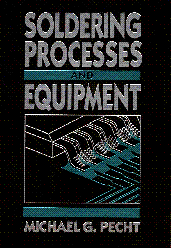In the last three decades,
soldering technology has developed from an art into a
high-technology science an evolution chiefly influenced by the
pressure placed on the soldering industry by advances in
microelectronics. This book addresses the major facets of modern
soldering technology and the science behind that technology. It
defines soldering and solder joints and describes the various steps
involved in soldering different types of printed circuit and wiring
boards, presents an overview of soldering in terms of various
alloys, fluxes, and pastes used in soldering, and discusses the
issues related to intermetallics and contaminants. Both wave
soldering and reflow soldering processes including, fluxing,
preheating, dispensing, screen printing, pin transfer, the various
solder waveforms, controlled atmospheres, and heat transfer methods
for reflow are discussed at length. Cleaning of soldered
assemblies and the issues concerning the elimination of CFC-based
solvents are detailed. One full chapter is dedicated to the
quality and reliability of solder joints with an emphasis placed on
the physics-of-failure approach to reliable soldering. Repair
and rework operations performed on through-hole, as well as
surface-mount, devices are described with guidelines provided for
component selection and assembly techniques. An appendix listing
various solder equipment manufacturers and a glossary of soldering
terms is included.
July 1993, 296 pages, ISBN: 0-471-59167-X
John Wiley & Sons Inc.
605 Third Avenue
New York, NY 10158-0012
Order Toll Free: 800-879-4539


 Soldering Processes and Equipment
Soldering Processes and Equipment
